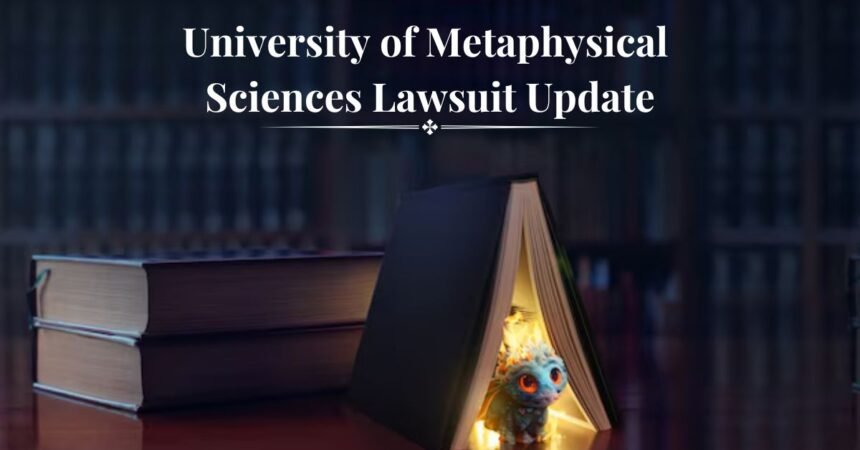The “University of Metaphysical Sciences Lawsuit” has become a focal point in the discussion surrounding alternative education and its regulatory landscape. This legal battle has sparked debates about accreditation, student rights, and the responsibilities of non-traditional educational institutions. In this article, we delve into the lawsuit’s origins, key developments, and its broader implications for students and policymakers, while addressing the central keyword: university of metaphysical sciences lawsuit update.
Understanding the University of Metaphysical Sciences (UMS)
The University of Metaphysical Sciences (UMS) was founded to provide education in metaphysical studies, spiritual growth, and alternative healing practices. Its programs, which include degrees in metaphysics, energy healing, and spiritual counseling, attracted students seeking non-traditional education paths. However, UMS has faced criticism due to its lack of accreditation by recognized educational authorities.
While UMS advertised itself as a spiritual and academic institution, its unconventional approach raised questions about the credibility of its degrees in professional settings. These concerns culminated in a lawsuit filed in 2020 by former students who alleged deceptive practices and financial misrepresentation.
Origins of the University of Metaphysical Sciences Lawsuit
The lawsuit against UMS emerged from grievances voiced by former students. Key allegations included:
- Deceptive Marketing Practices: Plaintiffs claimed that UMS marketed its degrees as professionally recognized despite lacking accreditation from legitimate educational bodies.
- Financial Misrepresentation: Students reported significant financial burdens, alleging they were misled into believing their degrees would hold tangible professional value.
- Subpar Educational Standards: Plaintiffs described inadequate resources and support, which left them dissatisfied with their educational experience.
These grievances led to a collective legal action to hold UMS accountable for misleading students and seeking compensation for tuition and related expenses.
Key Developments in the Lawsuit
Initial Proceedings (2020-2021)
Detailed testimonies from students and educational experts marked the early stages of the lawsuit. Plaintiffs argued that UMS failed to provide transparency about its accreditation status, leading them to invest in degrees with limited professional applicability.
UMS defended its position by asserting that its programs were designed for personal and spiritual growth, not traditional professional pathways. The institution argued that its students were informed about the non-traditional nature of its offerings.
2021 Milestones
Several pivotal events unfolded in 2021:
- Regulatory Attention: Educational regulatory bodies began scrutinizing unaccredited institutions like UMS. This spurred discussions about potential reforms to protect students.
- Student Advocacy Groups: Former students formed advocacy organizations to raise awareness about unaccredited institutions and push for stronger consumer protections.
- Court Hearings: Legal proceedings intensified, focusing on whether UMS’s marketing practices were misleading and if it adequately disclosed its lack of accreditation.
Recent Updates (2023-2024)
The “university of metaphysical sciences lawsuit update” has continued to evolve, with significant developments shaping the narrative:
- Focus on Accreditation:
- The lack of formal accreditation remains central to the case. Plaintiffs argue that this omission undermines the legitimacy of UMS degrees, limiting their utility in professional or academic settings.
- Financial Hardship:
- Many students involved in the lawsuit report ongoing financial strain, having invested in degrees they cannot use to advance their careers. This has become a critical theme in the legal proceedings.
- Broader Implications:
- The case has drawn attention to the need for regulatory oversight in alternative education. Advocacy groups have called for clearer guidelines to ensure transparency and protect students from similar situations.
Legal and Educational Implications
For Students:
The lawsuit underscores the importance of thoroughly researching educational institutions before enrolling. Prospective students should:
- Verify accreditation status.
- Understand the professional value of the offered degrees.
- Seek reviews and testimonials from alumni.
For Policymakers:
The case highlights regulatory gaps in the alternative education sector. Stricter standards and enforcement mechanisms could safeguard students from deceptive practices.
For Alternative Institutions:
UMS and similar institutions must prioritize transparency in marketing their programs. Clearly communicating the scope and limitations of their degrees is essential to building trust and credibility.
Lessons Learned from the University of Metaphysical Sciences Lawsuit
This landmark case offers valuable lessons for stakeholders in the education sector:
- Transparency is Crucial: Institutions must provide clear and accurate information about accreditation and degree applicability.
- Regulatory Oversight is Essential: Stronger regulations can help prevent misleading practices and protect students.
- Empowering Students: Prospective students should be equipped with resources to make informed decisions about their education.
- Balancing Innovation and Accountability: While alternative education can offer unique opportunities, it must meet basic standards of quality and ethics.
What’s Next for the University of Metaphysical Sciences?
As the lawsuit progresses, its outcomes will likely shape the future of UMS and other alternative education providers. Potential scenarios include:
- Increased Regulation: A ruling in favor of the plaintiffs could lead to stricter oversight and enhanced consumer protections.
- Heightened Awareness: Regardless of the legal outcome, the case has already raised awareness about the challenges and risks of unaccredited education.
The “University of Metaphysical Sciences Lawsuit Update” is a pivotal moment in the discourse on alternative education. By examining the case’s origins, developments, and implications, we gain insight into the challenges of balancing innovation with accountability. For students, educators, and policymakers, the lawsuit serves as a reminder of the importance of transparency and informed decision-making in education.
As the legal battle unfolds, its impact will resonate far beyond UMS, potentially transforming the landscape of alternative education and setting new standards for institutions worldwide. For now, all eyes remain on the courts as this landmark case continues to shape the future of metaphysical studies and beyond.







